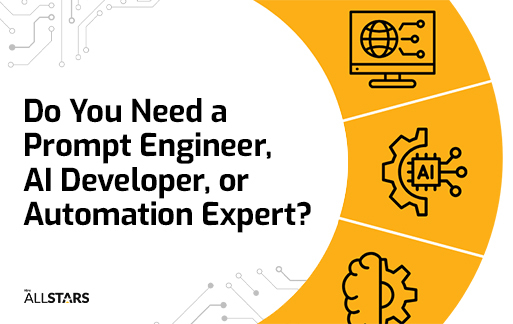What You’ll Learn?
Not sure if you need a prompt engineer, AI developer, or automation expert? Learn the difference, when to hire each one, and how no-code AI tools can help you get started fast.
Who is this For?
Business owners exploring how new AI roles can help boost productivity.
Meet the Team
Christy
Content Writer
If you're running a fast-growing startup or an e-commerce business, you're probably seeing all the buzz about AI and wondering: Who do I actually need to hire to get started? A prompt engineer? An AI developer? Or maybe someone to handle automations?
Here's the thing—there's a lot of overlap, and the tech is moving fast. In many cases, you can test things out yourself with no-code tools before bringing in a pro. But once you're ready to scale, it helps to know who does what—and when it makes sense to hire them. Let’s break it down.

What’s the Difference in Artificial Intelligence Roles?
Prompt Engineer
A prompt engineer is someone who’s really good at talking to AI tools like ChatGPT. Their job is to write the perfect prompts that get the AI to do what you want—whether that's writing product descriptions, generating code, or answering customer questions.
The catch? This role is becoming more of a skill than a full-time job. These days, anyone working with AI—developers, writers, marketers—needs to know how to write good prompts. So unless your whole business depends on AI output, you probably don’t need to hire someone just for this.
AI & Machine Learning Developer
Think of an AI developer as a software engineer who specializes in building apps that use AI. They can connect your product to OpenAI, Google AI, or whatever service you’re using, and build features like recommendation engines, smart chatbots, or an AI chatbot. AI developers build and integrate AI models and machine learning models into applications, often leveraging an AI model for specific tasks such as object detection or predictive analytics. If your idea needs serious coding, custom functionality, or advanced features, this is your person—AI developers often use sophisticated algorithms to deliver tailored solutions.
Automation Expert
An automation expert is all about saving you time. They look at how your team works and build workflows that handle repetitive tasks automatically. They might use tools like Zapier, Make, or even write custom scripts. For example, they could create a system that pulls new leads from a form, summarizes the info with ChatGPT, and sends it to Slack.
AI Project Ideas and Applications
Artificial intelligence is transforming industries by making it easier to solve real-world problems and streamline business operations. If you’re looking for AI project ideas to kickstart your journey or enhance your current workflow, there’s no shortage of possibilities—whether you want to analyze user behavior, boost operational efficiency, or enhance user engagement.
Here are some practical AI project ideas to consider:
- Handwritten Digit Recognition Project: Dive into computer vision by building a model that can recognize handwritten digits from image data. This classic project uses machine learning algorithms and computer vision techniques to identify patterns in pixel data—think of it as the foundation for more advanced image recognition systems.
- Image Classification: Use machine learning to train models that can recognize and categorize everyday objects, animals, or scenes in photos. With labeled datasets, you can experiment with different computer vision techniques to classify images into categories, making this a great way to gain hands-on experience with image processing.
- Movie Recommendation System: Build a recommendation system that predicts what movies users will enjoy based on their viewing history. By leveraging collaborative filtering and machine learning algorithms, you can create a movie recommendation system similar to those used by streaming services, helping users discover new content.
- Conversational AI: Create an AI-powered chatbot that can handle customer queries, book appointments, or provide product recommendations. Using natural language processing and machine learning, conversational AI can improve customer service and automate routine interactions.
- Sentiment Analysis: Analyze social media posts, product reviews, or customer feedback to determine the sentiment behind the text. Sentiment analysis uses natural language processing to identify patterns in unstructured data, helping businesses understand user opinions and market trends.
These project ideas are not only great for learning foundational AI concepts, but they also have real-world applications that can drive value for your business. Whether you’re interested in computer vision, natural language processing, or recommendation systems, there’s an AI project out there to match your goals.

AI Tools and Technologies
The right tools and technologies can make all the difference when it comes to building successful AI projects. Today’s AI landscape is packed with powerful resources that help you develop, train, and deploy machine learning models—no matter your level of technical expertise.
Here are some essential AI tools and technologies to consider for your next project:
- Machine Learning Frameworks: Frameworks like TensorFlow, PyTorch, and Keras are the backbone of modern AI development. They provide everything you need to build, train, and fine-tune machine learning models, from simple linear regression to advanced deep learning techniques.
- Deep Learning Techniques: Deep learning has revolutionized AI applications, especially in areas like computer vision and natural language processing. Techniques such as convolutional neural networks (CNNs) are ideal for image data and object detection, while recurrent neural networks (RNNs) excel at processing natural language and sequential data.
- Natural Language Processing (NLP) Libraries: Libraries like NLTK, spaCy, and Stanford CoreNLP make it easy to work with text data. They offer tools for tokenization, entity recognition, sentiment analysis, and more—perfect for building chatbots, analyzing social media posts, or extracting insights from unstructured data.
- Computer Vision Libraries: OpenCV and Pillow are go-to libraries for image processing and computer vision projects. Whether you’re working on object detection, image classification, or even a handwritten digit recognition project, these libraries provide robust tools for handling image data.
- Pre-trained Models: Save time and resources by leveraging pre-trained models like BERT, RoBERTa, and VGG16. These models have been trained on vast datasets and can be fine-tuned for your specific use case, whether it’s natural language understanding, image recognition, or sentiment analysis.
With these AI technologies at your fingertips, you can tackle a wide range of ai projects—from building neural networks for deep learning to deploying ai powered assistants that enhance user engagement. Whether you’re a data scientist or just starting to learn ai, these tools make it easier to bring your ai project ideas to life.
Not Sure Yet? Start with No-Code AI
Good news: You don’t have to hire a team of developers to start using AI. No-code platforms let you build simple AI projects with zero programming experience.
Want to create a chatbot that answers FAQs? Or use AI to write your product descriptions? Tools like ChatGPT, Zapier, and ManyChat make that possible—fast. You can build GPT automation projects, test your ideas, and only hire help when it’s time to scale.
Some beginner-friendly tools and projects:
- GPT for content: Generate blog posts, emails, or ad copy with ChatGPT.
- AI image generators: Use Midjourney or DALL-E to design logos, t-shirt art, or product visuals.
- No-code chatbots: Set up AI-powered bots for customer service.
- Zapier + AI: Automate your CRM, email replies, or Slack updates with GPT.
These are great starting points for experimenting—or even launching an AI-powered side hustle.
When to Hire (And Who to Hire)

Here’s a cheat sheet:
- Just getting started? Try no-code tools first. You can do a lot without writing code or hiring anyone.
- Need things to work together? Hire an automation expert. They’ll help you connect your tools and streamline processes.
- Building custom AI features or products? You’ll want an AI developer. Especially if data privacy or scalability is important.
- Prompt engineering? Look for someone who already knows how to write great prompts—but it’s usually a bonus skill, not a whole role.
Why Hire from the Philippines (Through AllStars)
Once you're ready to bring someone on board, hiring offshore can be a smart way to scale—without breaking the bank.
That’s where AllStars comes in. We help startups like yours hire top Filipino talent—developers, automation experts, and more—and we take care of all the HR, payroll, and compliance stuff for you. As a registered Employer of Record (EOR) in the Philippines, we handle:
- Payroll processing
- Government benefits (SSS, Pag-IBIG, PhilHealth, 13th month)
- Leave management
- Private health insurance
- Local HR support and compliance
You get a skilled team member without the paperwork headache. Whether you need someone to build a custom GPT tool or automate your operations, we’ve got your back.
Ready to Scale with AI Technologies?
You don’t need to hire a full AI team on day one. Start small. Test your ideas with no-code AI. Figure out what really works for your business.
And when you're ready to scale? Hire smarter—with Filipino tech talent backed by AllStars.
Need help finding your first AI hire? Book a call with us and let’s talk.
-7%201.png)
